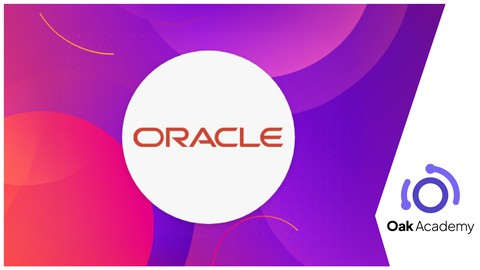
Full Oracle Database Administration With High Availability
Full Oracle Database Administration With High Availability, available at $94.99, has an average rating of 4.15, with 156 lectures, 43 quizzes, based on 234 reviews, and has 2562 subscribers.
You will learn about This course is a complete set of Oracle Database Administration with High Availability. You will become an expert in subjects like Oracle DBA, Oracle 12C Release 2, Oracle 12C R2 Backup and Recovery ( using RMAN), Oracle Data Guard You would be able to install the necessary Oracle Software/Database Creating and Starting Oracle Database Database Concepts And Fundamentals Inserting, Updating and Deleting Data In The Table Using Ampersand Subtition To Make More Dynamic Queries Backup and recovery concepts in Oracle Setting up the laboratory environment Creating and managing recovery catalog Using flashback Technologies in Oracle Managing RMAN backups Setting Up Oracle Enterprise Linux What is Real Application Cluster? Install Grid Infrastructure, Database Software and Create database Administer Database Instances and Cluster Databases Learn about Oracle RAC One Node To convert RAC database to RAC One Node and administer it Design and Deployment Techniques Data Guard Administration for Oracle 12C R2 Creating Virtual Machines Basic Usage of Data Guard Broker Utility Switchover and Failover Operations on Physical Standby Database via both SQLPlus and Data Guard Broker Creating Far Sync Instance Configuring Primary and Standby Databases for far sync Instance Switchover & Failover Operations on Logical Standby Database via both SQLPlus and Data Guard Broker Oracle Database is an enterprise database that can handle online transaction processing needs, as well as data warehousing and workloads for ERP Oracle DB was designed to be a flexible way to handle large applications and massive amounts of structured data. SQL stands for Structured Query Language—the language developers use to interact with databases to create, read, update, and delete database records ANSI created the standard for SQL. Many database vendors, like Oracle, expand on this standard to create their version of the language. Oracle SQL is compliant with ANSI SQL standards, with features designed specifically for the Oracle database management system. Oracle SQL extends the SQL standard with a procedural language PL/SQL and adds the ability to use the Java programming language. What careers use Oracle SQL? Having Oracle SQL skills can add value to many careers. The most obvious is being a database administrator in enterprises that use the Oracle database management system. This course is ideal for individuals who are Anyone who is Oracle Database beginner but wants to become expert or DBA`s who are looking to sharpen their skills to the expert level or DBA`s that manage other RDBMS and want to immigrate Oracle or DBA`s that manage other RDBMS and want to immigrate Oracle or Anyone who wants to become an Oracle DBA at a big company or People who want to learn Oracle DBA or People who want to learn Oracle Database Administration or People who want to learn Oracle Rman or People who want to learn Oracle RAC It is particularly useful for Anyone who is Oracle Database beginner but wants to become expert or DBA`s who are looking to sharpen their skills to the expert level or DBA`s that manage other RDBMS and want to immigrate Oracle or DBA`s that manage other RDBMS and want to immigrate Oracle or Anyone who wants to become an Oracle DBA at a big company or People who want to learn Oracle DBA or People who want to learn Oracle Database Administration or People who want to learn Oracle Rman or People who want to learn Oracle RAC.
Enroll now: Full Oracle Database Administration With High Availability
Summary
Title: Full Oracle Database Administration With High Availability
Price: $94.99
Average Rating: 4.15
Number of Lectures: 156
Number of Quizzes: 43
Number of Published Lectures: 156
Number of Published Quizzes: 43
Number of Curriculum Items: 199
Number of Published Curriculum Objects: 199
Original Price: $199.99
Quality Status: approved
Status: Live
What You Will Learn
- This course is a complete set of Oracle Database Administration with High Availability.
- You will become an expert in subjects like Oracle DBA, Oracle 12C Release 2, Oracle 12C R2 Backup and Recovery ( using RMAN), Oracle Data Guard
- You would be able to install the necessary Oracle Software/Database
- Creating and Starting Oracle Database
- Database Concepts And Fundamentals
- Inserting, Updating and Deleting Data In The Table
- Using Ampersand Subtition To Make More Dynamic Queries
- Backup and recovery concepts in Oracle
- Setting up the laboratory environment
- Creating and managing recovery catalog
- Using flashback Technologies in Oracle
- Managing RMAN backups
- Setting Up Oracle Enterprise Linux
- What is Real Application Cluster?
- Install Grid Infrastructure, Database Software and Create database
- Administer Database Instances and Cluster Databases
- Learn about Oracle RAC One Node
- To convert RAC database to RAC One Node and administer it
- Design and Deployment Techniques
- Data Guard Administration for Oracle 12C R2
- Creating Virtual Machines
- Basic Usage of Data Guard Broker Utility
- Switchover and Failover Operations on Physical Standby Database via both SQLPlus and Data Guard Broker
- Creating Far Sync Instance
- Configuring Primary and Standby Databases for far sync Instance
- Switchover & Failover Operations on Logical Standby Database via both SQLPlus and Data Guard Broker
- Oracle Database is an enterprise database that can handle online transaction processing needs, as well as data warehousing and workloads for ERP
- Oracle DB was designed to be a flexible way to handle large applications and massive amounts of structured data.
- SQL stands for Structured Query Language—the language developers use to interact with databases to create, read, update, and delete database records
- ANSI created the standard for SQL. Many database vendors, like Oracle, expand on this standard to create their version of the language.
- Oracle SQL is compliant with ANSI SQL standards, with features designed specifically for the Oracle database management system.
- Oracle SQL extends the SQL standard with a procedural language PL/SQL and adds the ability to use the Java programming language.
- What careers use Oracle SQL? Having Oracle SQL skills can add value to many careers.
- The most obvious is being a database administrator in enterprises that use the Oracle database management system.
Who Should Attend
- Anyone who is Oracle Database beginner but wants to become expert
- DBA`s who are looking to sharpen their skills to the expert level
- DBA`s that manage other RDBMS and want to immigrate Oracle
- DBA`s that manage other RDBMS and want to immigrate Oracle
- Anyone who wants to become an Oracle DBA at a big company
- People who want to learn Oracle DBA
- People who want to learn Oracle Database Administration
- People who want to learn Oracle Rman
- People who want to learn Oracle RAC
Target Audiences
- Anyone who is Oracle Database beginner but wants to become expert
- DBA`s who are looking to sharpen their skills to the expert level
- DBA`s that manage other RDBMS and want to immigrate Oracle
- DBA`s that manage other RDBMS and want to immigrate Oracle
- Anyone who wants to become an Oracle DBA at a big company
- People who want to learn Oracle DBA
- People who want to learn Oracle Database Administration
- People who want to learn Oracle Rman
- People who want to learn Oracle RAC
Hey there,
Welcome to my Full Oracle Database Administration With High Availabilitycourse.
Oracle Database Administration, Oracle DBA, Oracle 12C RAC, Oracle Database 12C R2 Backup and Recovery, Oracle RMAN
This course is a complete set of Oracle Database Administration with High Availability. Oracle database administration, oracle RAC, oracle dba, database administration, oracle, oracle 12c database administration, rman, oracle database, oracle rman, rac, oracle database rac administration, oracle RAC 12c
Through this course, you will learn all the features of High Availability and will become an expert in Oracle Database Administration.We gathered all the subjects like Oracle DBA, Oracle 12C Release 2, Oracle 12C R2 Backup and Recovery ( using RMAN), Oracle Data Guard, and all High Availability features that you need to know about Oracle Databases in the real world in one course.
If you say I want to specialize in the database and want to learn database subjects in every aspect, you are at the right place!
In the course, you will have down-to-earth way explanations with hands-on examples.During the course, we focus more on the practical side of Oracle Databases. All my students will have a chance to learn not only the whats but also learn the whys and hows.
This course starts with the very basics. First, you will learn how to install the tools. Then the show will start and we will start with introducing the Oracle Database architecture, this course will take you all away from performing basic database operations up to implementing advanced operation options.
Oracle Database is an enterprise database that can handle online transaction processing needs, as well as data warehousing and workloads for enterprise resource planning (ERP). Oracle DB was designed to be a flexible way to handle large applications and massive amounts of structured data.
At the end of the course;
-
DML ( Data Manipulating Language ) and TCL ( Transaction Control Language ),
-
Retrieving Data,
-
Restricting And Sorting Data,
-
Using Single-Row Functions and Customize Output,
-
Using Conversion Functions and Conditional Expressions,
-
Reporting Aggregated Data Using The Group Functions,
-
Defining Table Joins and Displaying Data from Multiple Tables,
-
Using Subqueries,
-
Backup and recovery concepts in Oracle
-
Setting up the laboratory environment
-
Creating and managing the recovery catalog
-
Using flashback Technologies in Oracle
-
Backing up the database
-
Reporting on RMAN operations.
-
Managing RMAN backups
-
Using Data Recovery Advisor of Oracle
-
Restoring and recovering database and database objects.
-
The point-in-time recovery concept in Oracle will be crystal clear for you.
-
What is RAC ( Real Application Cluster )
-
Creating Virtual Machines
-
Administer Database Instances and Cluster Databases
-
Oracle RAC One Node
-
How to Convert RAC Database to RAC One Node
-
Workload Management
-
Monitoring Performance
-
Design and Deployment Techniques
-
Cloning Oracle RAC
-
Managing backup, and restoring cluster database
-
Add and Delete Node From Cluster
-
What is Dataguard
-
Cloning Virtual Machines
-
Installing Database Software and Creating Database
-
Creating Physical Standby Database
-
Managing Physical Standby Database
-
Basic usage of Data Guard Broker Utility
-
Creating and managing snapshot databases
-
Switchover and failover operations on physical standby database via both SQLPlus and Data Guard Broker
-
Creating Far Sync Instance
-
Configuring primary and standby databases for far sync instance
-
Creating Logical Standby database
-
Managing Logical Standby database
-
Oracle Database Administration
-
Oracle RAC
-
Oracle DBA
-
Oracle 12c Database Administration
-
Oracle RMAN
What is Oracle SQL?
SQL stands for Structured Query Language—the language developers use to interact with databases to create, read, update, and delete database records and manage other aspects of those databases. ANSI created the standard for SQL. Many database vendors, like Oracle, expand on this standard to create their version of the language. Oracle SQL is compliant with ANSI SQL standards, with features designed specifically for the Oracle database management system. This RDBMS was released as the first commercially available relational database management system in 1977 and holds the top market share worldwide for relational database management systems. Oracle SQL extends the SQL standard with a procedural language PL/SQL and adds the ability to use the Java programming language.
What careers use Oracle SQL?
Having Oracle SQL skills can add value to many careers. The most obvious is being a database administrator in enterprises that use the Oracle database management system. But SQL dialects are pretty similar, and knowledge of Oracle SQL can apply to many types of relational databases and doesn’t limit you to Oracle. Database developers also use Oracle SQL all day long to create new databases and table structures. Most applications require a database to function, so software engineers and web developers also use Oracle SQL frequently. Data scientists must access data to create machine learning models and find trends, and a lot of this data will get stored in databases that require a knowledge of SQL to retrieve and transform. Business analysts also use Oracle SQL to generate reports that help businesses get to their next stage.
What skills should I have before learning Oracle SQL?
There are no prerequisites to learning Oracle SQL. Oracle SQL has a simpler syntax than many standard programming languages and reads almost like English. Most people can understand what a SQL query is trying to do before they even know the language. All you need is an interest in the language and a commitment to learning. That said, some things could help with your Oracle SQL education if you are already familiar with them. If you are familiar with Excel spreadsheets and understand how columns and rows work, you can apply that knowledge to Oracle database tables. It also helps to know at least the concepts of how a relational database management system works. Also, if you already know a programming language, that will help learn Oracle’s extended features like PL/SQL.
Fresh Content
Oracle is a unique technology that provides high availability and scalability for all application types. It prevents the server from being a single point of failure. And this course introduces all the Oracle Database High Availability features fundamental to managing Oracle Database and designing a backup and recovery.
Why would you want to take this course?
Our answer is simple: The quality of teaching.
When you enroll, you will feel our seasoned developers’ expertise.
Step-by-Step Way, Simple and Easy With Exercises
By the end of the course, you’ll have a firm understanding of the Oracle Database in all aspects and valuable insights on how things work under the hood and you’ll also be very confident, and hungry to learn more.
Video and Audio Production Quality
All our videos are created/produced as high-quality video and audio to provide you the best learning experience.
You will be,
-
Seeing clearly
-
Hearing clearly
-
Moving through the course without distractions
You’ll also get:
Lifetime Access to The Course
Fast & Friendly Support in the Q&A section
Udemy Certificate of Completion Ready for Download
Dive in now to our Full Oracle Database Administration With High Availability course
We offer full support, answering any questions.
See you in the course!
Course Curriculum
Chapter 1: Getting Started to Oracle DBA, Oracle Database Administration
Lecture 1: What We Will Learn in Full Oracle Database Administration course?
Lecture 2: Project Files and Course Documents – Oracle RAC, Oracle DBA
Chapter 2: Oracle Database Administration Setting Up
Lecture 1: FAQ about Oracle Database Administration, Oracle Rman, Oracle Rac
Lecture 2: Downloading Oracle Software in Oracle Rman
Lecture 3: Extracting Files in Oracle Database Administration
Lecture 4: Installing Oracle 12c Database
Lecture 5: Startup Instance on Windows
Lecture 6: Shutdown Instance in Oracle Database 12c
Lecture 7: Make SQL Developer Run Faster in Oracle Database Administration
Lecture 8: Oracle Live SQL
Chapter 3: Installation of Oracle Database on Linux
Lecture 1: Download Virtualbox in Oracle Database Administration
Lecture 2: Download Linux in Oracle Rman
Lecture 3: Download Oracle Software in Oracle Database Administration
Lecture 4: Install Virtualbox in Oracle Database Administration
Lecture 5: Create Virtual Machine in Oracle Database Administration
Lecture 6: Install Linux in Oracle Database Administration
Lecture 7: Prerequests in Oracle Database Administration
Lecture 8: Oracle Software Installation
Lecture 9: Create Oracle Database
Chapter 4: After Installations in Oracle Database Administration
Lecture 1: Startup & Shutdown Instance From Client in Oracle Database Administration
Lecture 2: Connect Database From Client in Oracle Database Administration
Chapter 5: Database and RDBMS Concepts
Lecture 1: Learn Data, Database and RDBMS Concepts in Oracle Database Administration
Chapter 6: DDL (Data Definition Language) in Oracle Database Administration
Lecture 1: What is DDL?
Lecture 2: Connect and Start to Create Objects in Oracle Database Administration
Lecture 3: Create Tablespace in Oracle Database Administration
Lecture 4: Create User in Oracle Database Administration
Lecture 5: Create Table in Oracle Database Administration
Lecture 6: Create Synonym in Oracle Database Administration
Lecture 7: Alter Objects in Oracle Database Administration
Lecture 8: Drop Objects in Oracle Database Administration
Lecture 9: Section Practice in Oracle Database Administration
Chapter 7: DML (Data Manipulating Language) and TCL (Transaction Control Language)
Lecture 1: DML and TCL in Oracle Database Administration
Lecture 2: Insert Data to Table in Oracle Database Administration
Lecture 3: Update Table Data in Oracle Database Administration
Lecture 4: Delete from Table in Oracle Database Administration
Chapter 8: Retrieving, Restricting and Reporting Data
Lecture 1: Basic Select Statement in Oracle Database Administration
Lecture 2: "Like" Operator in Oracle Database Administration
Lecture 3: Sorting Data in Oracle Database Administration
Lecture 4: Limiting The Resultset in Oracle Database Administration
Lecture 5: Using Ampersand (&) Subtition
Lecture 6: Single Row Operators in Oracle Database Administration
Lecture 7: Single Row Functions
Lecture 8: Conversion Functions
Lecture 9: Using Group Functions in Oracle Database Administration
Lecture 10: Restricting Reported Data in Oracle Database Administration
Lecture 11: Joining Tables in Oracle Database Administration
Lecture 12: Using Subqueries in Oracle Database Administration
Lecture 13: Exists And Not Exists in Oracle Database Administration
Lecture 14: "With" Clause in Oracle Database Administration
Lecture 15: Using The Set Operators in Oracle Database Administration
Lecture 16: What We Have Learned in Oracle Database Administration?
Chapter 9: Schema Objects And Managing Schema
Lecture 1: Schema Objects With SQL Developer
Lecture 2: Using Dictionary Views To Manage Schema
Lecture 3: What We Have Learned In This Section?
Chapter 10: Controlling User Access in Oracle DBA
Lecture 1: Controlling User Access in Oracle DBA
Lecture 2: Section Summary in Oracle DBA
Chapter 11: Manipulating Large Data Sets in Oracle DBA
Lecture 1: Manipulating Large Data Sets in Oracle DBA
Lecture 2: Section Summary in Oracle DBA
Chapter 12: Oracle DBA Homework
Lecture 1: Be Ready For The Homework
Chapter 13: Oracle 12C Release 2 Backup and Recovery Using RMAN
Lecture 1: Let's See What We Will Cover In This RMAN Course
Chapter 14: Downloads for Oracle Backup and Recovery
Lecture 1: Download Virtualbox for Oracle Backup and Recovery
Lecture 2: Download Linux for Oracle Backup and Recovery
Lecture 3: Download Oracle Software for Oracle Backup and Recovery
Chapter 15: Installation for Oracle Backup and Recovery
Lecture 1: Install Virtual Box for Oracle Backup and Recovery
Lecture 2: Create Virtual Machine
Lecture 3: Install Guest Operating System for Oracle Backup and Recovery
Lecture 4: Prerequisites
Lecture 5: Oracle Software Installation for Oracle Backup and Recovery
Lecture 6: Clone Virtual Machine for Oracle Backup and Recovery
Lecture 7: Create Primary Database
Lecture 8: Create Catalog Database
Lecture 9: Create Sample Data
Chapter 16: Intro to Backup and Recovery
Lecture 1: Introduction to Backup and Recovery
Instructors
-

Oak Academy
Web & Mobile Development, IOS, Android, Ethical Hacking, IT -

OAK Academy Team
instructor
Rating Distribution
- 1 stars: 7 votes
- 2 stars: 3 votes
- 3 stars: 24 votes
- 4 stars: 61 votes
- 5 stars: 139 votes
Frequently Asked Questions
How long do I have access to the course materials?
You can view and review the lecture materials indefinitely, like an on-demand channel.
Can I take my courses with me wherever I go?
Definitely! If you have an internet connection, courses on Udemy are available on any device at any time. If you don’t have an internet connection, some instructors also let their students download course lectures. That’s up to the instructor though, so make sure you get on their good side!
You may also like
- Digital Marketing Foundation Course
- Google Shopping Ads Digital Marketing Course
- Multi Cloud Infrastructure for beginners
- Master Lead Generation: Grow Subscribers & Sales with Popups
- Complete Copywriting System : write to sell with ease
- Product Positioning Masterclass: Unlock Market Traction
- How to Promote Your Webinar and Get More Attendees?
- Digital Marketing Courses
- Create music with Artificial Intelligence in this new market
- Create CONVERTING UGC Content So Brands Will Pay You More
- Podcast: The top 8 ways to monetize by Podcasting
- TikTok Marketing Mastery: Learn to Grow & Go Viral
- Free Digital Marketing Basics Course in Hindi
- MailChimp Free Mailing Lists: MailChimp Email Marketing
- Automate Digital Marketing & Social Media with Generative AI
- Google Ads MasterClass – All Advanced Features
- Online Course Creator: Create & Sell Online Courses Today!
- Introduction to SEO – Basic Principles of SEO
- Affiliate Marketing For Beginners: Go From Novice To Pro
- Effective Website Planning Made Simple




















